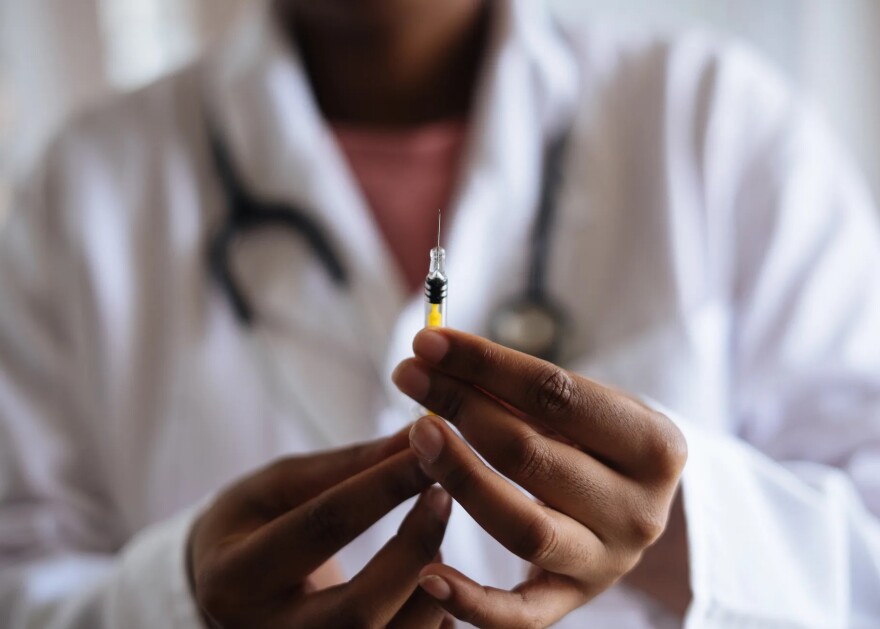Drug manufacturers have released promising early results for their COVID-19 vaccines, but skepticism among Americans remains high -- especially for African Americans, who the virus has hit harder than other groups.
African Americans are nearly three times more likely to die from COVID-19 compared to white Americans, the Centers for Disease Control and Prevention estimates. Members of the medical community worry whether one of the most at-risk populations will be unwilling to be vaccinated.
“You have a scientific task of developing a safe and effective vaccine, and you have a PR task of making sure people understand why it’s important to them and their families to get vaccinated,” said Dr. Anthony Fauci, a leading member of the White House’s coronavirus task force, on .
Mia McLendon signed up to participate in a COVID vaccine trial to show others she believes it’s safe, she told a group of reporters at a press conference. Still, as Black woman she said she’s experienced skepticism from friends and family first-hand.
“They will make comments as, ‘Well I will let, you know, other people go ahead and try to get that shot before I even attempt to do it,’” McLendon said.
McLendon wants to advocate for the vaccine because others are taking a “wait and see” approach.

A recent Gallup poll found that less than half of non-white American adults would be willing to receive a COVID vaccine -- compared to 61 percent of white adults. A Pew Research poll from October showed that only 32 percent of Black adults were willing to get vaccinated.
Communication plan
The Indiana State Department of Health’s vaccine distribution plan includes messaging to communities of color. In a statement, the ISDH says it’s still developing this strategy alongside partners including the Indiana Minority Health Coalition.
“So you need an organization like ours to help bring balance or bring the prospect of a sharper vision for what we're trying to do to this effort,” said Minority Health Coalition president Carl Ellison.
Ellison said convincing Black Hoosiers to get vaccinated will be an uphill battle, and will require a multi-year effort from the state department of health.
“So you can't say, ‘We’ll do an awareness campaign for each phase of the rollout, and we'll do it at six weeks,’ whatever. That's like, why bother?” Ellison said. “Because what you're trying to change is fundamentally baked in response to racism in the health delivery system.”
Still, Ellison thinks it can be done with the right messengers -- like leaders within the Black community -- but they can’t do it alone. And getting these leaders on board will also need to be part of the process.
“Are you going to give us some resources for an awareness campaign?” Ellison said. “But give us a nickel when we need $10?”
A question of trust
Some and bridging the access gap, like mobile vaccination providers that can go to churches, grocery stores and barber shops.
One of these trusted places in Indianapolis is . The center’s chief medical director Dr. Sheri-Lyn Makombe has been in talks with state officials about vaccine distribution.
“What concerns me is not their efforts. What concerns me is that we have in this country a history that is not conducive to minorities participating in something that would save their life,” Makombe said.
One example is the infamous , which enrolled Black men with syphilis who were told they would get treatment. Instead, researchers secretly withheld that treatment. Many of these men died. The study ended in the early 1970s, well within memory for African Americans.
“No amount of media messaging can erase the past,” Makombe said. “Unless your media messaging and public messaging is specific to acknowledging what has happened in the past and how this is different.”
Local hospitals and the city of Indianapolis have formally acknowledged racism as a public health issue. However, the state has not -- a move that Makombe says could help build trust.

Who gets the vaccine first?
The initial stages of vaccine distribution appear on the horizon, with the first doses slated to be sent out at the end of this month. Most states have determined the first doses will go to healthcare workers and hospital staff, followed by vulnerable populations and then essential workers.
Some have pushed for the first vaccine doses doled out to hospitals to include hospital custodial staff, and healthcare workers including nursing assistants -- not just doctors and nurses.
African Americans make up almost 20 percent of COVID deaths, but only account for 13 percent of the U.S population, according to CDC data.
“It's not just ‘Oh, these people just happen to all get COVID’” said Yolonda Wilson, a bioethicist and National Humanities Center fellow. “You can tie very specific government policy, historical action and inaction at federal, state and local levels that have created circumstances where these populations of people are more vulnerable.”
Wilson said essential workers are -- --people of color, and are the very people who could benefit from the vaccine.
However, Wilson says the skepticism is justified, and to overcome the past America needs to confront the intersection of health, discrimination and trust head-on.
This story was produced by, a news collaborative covering public health.
Copyright 2021 Side Effects Public Media. To see more, visit . 9(MDA5NTM4MTIyMDE0MTg3NDc2MTVlZjdmNQ001))






